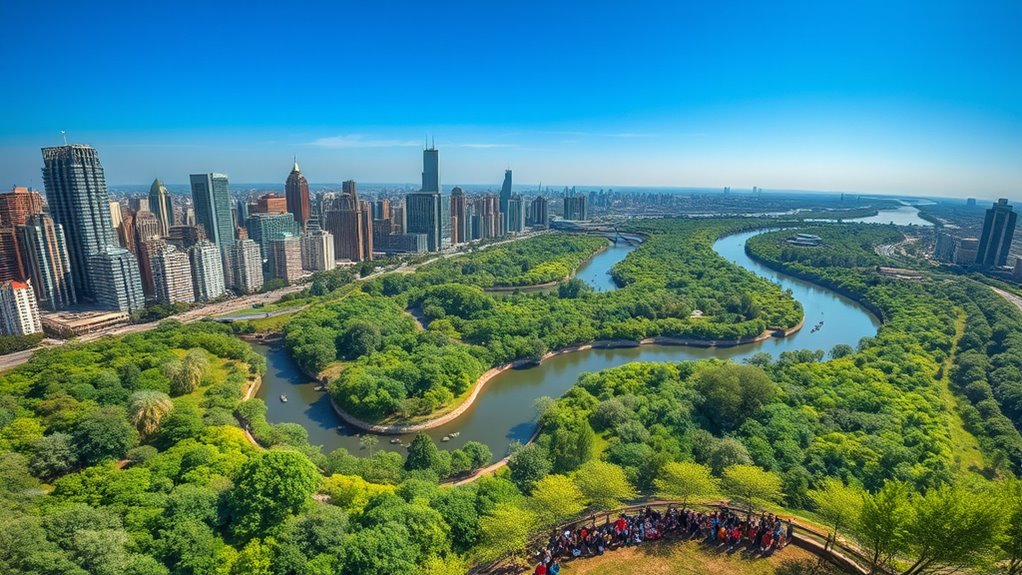Knowing your climate rights means understanding laws that protect both the environment and your health. These laws ensure communities can hold polluters accountable and demand cleaner air, safer neighborhoods, and access to renewable energy. They also empower you to participate in advocacy and push for fair policies that address environmental injustice. By understanding these protections, you can help promote equitable, sustainable solutions—if you keep exploring, you’ll find how these laws shape a healthier planet for everyone.
Key Takeaways
- Climate rights laws empower communities to protect their environment and health amid climate change impacts.
- They ensure vulnerable populations receive equal protection from environmental hazards and pollution.
- Renewable energy policies promote equitable access to clean energy and reduce reliance on fossil fuels.
- Laws support community advocacy, enabling grassroots efforts to hold polluters accountable.
- Legal protections foster a just transition to sustainability, safeguarding human rights and environmental justice.

Climate rights laws are emerging as a crucial tool to guarantee that communities and individuals can safeguard their environment and health in the face of climate change. These laws aim to address the disparities caused by environmental injustices, ensuring that vulnerable populations aren’t left behind as the world transitions to a more sustainable future. When you understand your rights under these laws, you gain power to advocate for cleaner air, safer neighborhoods, and fairer access to resources. One of the key elements of climate rights legislation is its focus on environmental justice. Historically, marginalized communities—such as low-income neighborhoods and communities of color—have borne the brunt of pollution, industrial waste, and climate-related disasters. By enshrining environmental justice into law, governments are recognizing that everyone deserves equal protection from environmental harm, regardless of socioeconomic status or location. This legal recognition enables affected communities to demand accountability from polluters and push for policies that prioritize their health and well-being.
Renewable energy policies are also integral to climate rights, as they directly influence a community’s exposure to harmful emissions and contribute to a sustainable future. These policies encourage the development and adoption of clean energy sources like solar, wind, and hydropower. When you’re aware of these laws, you can participate more actively in local initiatives or advocacy efforts aimed at expanding renewable energy projects. Such policies not only reduce reliance on fossil fuels but also create job opportunities and foster energy independence within communities. Climate rights laws often mandate that renewable energy projects consider social equity, ensuring that benefits are shared broadly and that no group is marginalized during the transition. If your community is affected by outdated energy infrastructure or pollution, understanding these policies empowers you to push for investments in renewable energy that can lead to healthier environments and economic revitalization. Additionally, public awareness and education play a vital role in ensuring that communities can effectively advocate for their climate rights and hold policymakers accountable.
In essence, these laws serve as a foundation for equitable climate action. They reinforce that safeguarding the environment isn’t just a matter of protecting nature but also about protecting human rights. By knowing your climate rights, you can hold authorities accountable, advocate for policies rooted in environmental justice, and support renewable energy initiatives that benefit everyone. As climate change accelerates, legal protections become more crucial than ever, ensuring that no community is left vulnerable or unheard. Your awareness of these laws can drive meaningful change, helping build a resilient, just, and sustainable future for all.
Frequently Asked Questions
How Can Individuals Enforce Climate Rights Laws Effectively?
To enforce climate rights laws effectively, you should boost public awareness about these rights and how they protect the environment. Engage in legal advocacy by supporting organizations that push for stronger climate policies and hold polluters accountable. Stay informed about your rights and participate in community actions or protests. Your active involvement can pressure policymakers to uphold environmental laws, ensuring they’re enforced and that your climate rights are protected.
Are Climate Rights Laws the Same in Every Country?
Think of climate rights laws as a patchwork quilt—each piece different. You’ll find that they aren’t the same in every country, as international standards set broad goals, but legal variations create unique rules locally. Some nations have strong protections, while others lack enforceable laws. You need to understand your country’s specific laws to effectively advocate for climate rights, knowing that global consistency isn’t always guaranteed.
What Are the Penalties for Violating Climate Protection Laws?
When you violate climate protection laws, you may face environmental fines and criminal sanctions, depending on your country’s regulations. These penalties aim to deter harmful actions like illegal emissions or pollution. Penalties vary widely—some regions impose hefty fines, while others pursue criminal charges that could lead to imprisonment. It’s essential to understand local laws to avoid these consequences and help protect the environment for everyone.
How Do Climate Rights Laws Impact Economic Development?
Climate rights laws promote environmental justice and foster sustainable growth by encouraging responsible resource use. As you follow these laws, you’ll see industries innovate toward greener practices, creating jobs and boosting economies. They also make certain marginalized communities benefit from environmental protections. By balancing economic development with environmental stewardship, these laws help you build resilient communities, attract investments, and support long-term prosperity while safeguarding the planet for future generations.
Can Businesses Be Held Accountable Under Climate Rights Legislation?
Imagine a ticking clock—that’s how climate accountability pressures businesses today. Under climate rights legislation, you can’t hide behind corporate responsibility; legal accountability becomes the spotlight. Laws now hold you responsible for environmental impact, demanding sustainable practices. As a business, you’re expected to lead change, not just follow. This shift emphasizes that protecting the planet isn’t optional—it’s a legal duty, and you’ll be held accountable if you ignore it.
Conclusion
Now that you know your climate rights, imagine the power you hold. Every law you understand is a tool to protect our planet, shaping a future where your voice can ignite change. But the fight isn’t over—hidden threats still lurk in the shadows, waiting to undo progress. Will you stay informed and stand firm? The next move is yours. Your actions could be the key to opening a sustainable world—are you ready to take that step?









